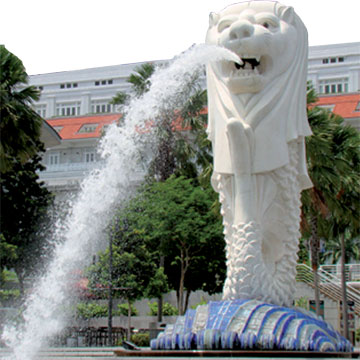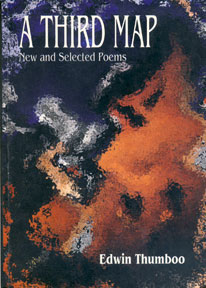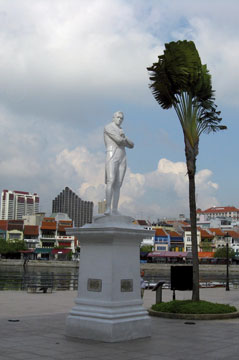|
The gentle soul of Singaporean poetry :
Pivotal role of a public poet in nation building
By Ranga CHANDRARATHNA
[Part i]
 Edwin Thumboo is one of Singapore's most distinguished poets, an
Emeritus Professor of English (1997), at the National University of
Singapore. He is, undoubtedly, Asia's most eminent Anglophone poet,
whose repertoire of writings and academic papers have been studied in
universities all over the world. Edwin Thumboo is one of Singapore's most distinguished poets, an
Emeritus Professor of English (1997), at the National University of
Singapore. He is, undoubtedly, Asia's most eminent Anglophone poet,
whose repertoire of writings and academic papers have been studied in
universities all over the world.
The life and times of Edwin Thumboo
Edwin Nadason Thumboo (born 22 November 1933) is an award-winning
Singaporean poet and academic, who is regarded as one of the pioneers of
English literature in Singapore.
Edwin Thumboo comes from a large family with five sisters and two
brothers. His childhood in a house nestled at the foothills of Mandai
hills was seemingly idyllic. When I attended the Singapore Writers'
Festival, I had the rare privilege of an escorted tour to Mandai by
Professor Thumboo.
Thumboo has written several poems claiming time and again how his
early days sensitised him to nature's beauty at Mandai spending his
happy childhood there.
After his early education at Victoria School he entered the
University of Malaya in 1957, After graduation, with B.A. honours,
Thumboo entered the civil service and worked for nine years including
the role of assistant secretary in the Singapore Telephone Board prior
to becoming an academic. Thumboo received a Ph.D. in 1970 completing a
thesis on African literature.
He was first appointed as Professor of English in January 1979.
Professor Thumboo also served as the Head of the Department of English
Language and Literature (1977-1993), the first Dean of the Faculty of
Arts and Social Sciences (1980-1991) and Professorial Fellow
(1995-2002).
As an academic, he has taught Elizabethan and Jacobean Drama, the
Romantic poets, Singapore and Malaysian Literatures, as well as courses
in creative writing. His research interests included The English Novels
of Forster, Lawrence, Conrad) and the Novels of Empire (Kipling, etc.),
Commonwealth Literature (Bessie Head, etc.), and Shakespeare (the Roman
Plays).
 Prof. Thumboo introduced the study of Commonwealth new literatures in
English. Another key initiative of Thumboo was the introduction of
English Language as a major so that the department's graduates could be
better trained to undertake English teaching in schools and junior
colleges. Prof. Thumboo introduced the study of Commonwealth new literatures in
English. Another key initiative of Thumboo was the introduction of
English Language as a major so that the department's graduates could be
better trained to undertake English teaching in schools and junior
colleges.
Thumboo's works
Prof. Thumboo has contributed to the Singapore Arts scene chiefly in
the area of literature. His works on poetry include: Rib of Earth
(1956), Gods Can Die (1977), Ulysses by the Merlion (1979), and A Third
Map (1993); Friends, (2002), Still Travelling (2008), Bring The Sun
(2008) and two collections on nursery rhymes: Child's Delight 1 & 2.
In addition to his work and contribution to poetry, Edwin Thumboo has
edited and published numerous critical articles and anthologies covering
subjects such as Singapore and Malaysian Literature, The World Englishes
and served as the General Editor of several anthologies.
Some of these works include Seven Poets: Singapore/Malaysia, An
Anthology (1973), The Second Tongue: An Anthology of Poetry from
Malaysia and Singapore (1979), Anthology of ASEAN Literatures: The
Poetry of Singapore (1985), and The Fiction of Singapore (1990). He is
Consulting Editor for World Englishes and Editorial Consultant for
Westerly; he is also a member of the Editorial Board of Solidarity.
Edwin Thumboo as a foremost anglophone poet
The most extended discussion of his poetry is by Thumboo's long time
friend and poet, Ee Tiang Hong's Responsibility and Commitment: The
Poetry of Edwin Thumboo (1997). His former colleague and long time
friend, Hong Kong based Jonathan Webster has written and published some
very insightful linguistic and most recently interpretation of Edwin
Thumboo's work.
One of the salient roles that Prof. Edwin Thumboo plays in the
literary landscape of Singapore is the role of a public poet. Apart from
the Yeatsian sensibility and aesthetics (It is a fact that Prof. Thumboo
is inspired by W.B Yeats and his poetry), his remarkable corpus of
poetry can also be considered as potent social commentaries and
critiques, a fact continues to be of relevance even to his latest
poetry. On his role as a public poet, Ee Tiang Hong in Responsibility
and Commitment describes in detail the genesis of Singaporean literary
landscape and the pivotal role Prof. Edwin Thumboo played in it.
"...At any rate, literature in English that emerged presented an
alternative, perhaps, a more relevant, if not more zestful
contributions, to writings in the Anglo-Saxon tradition. The field was
particularly congenial in the light of Thumboo's longstanding interest
in mythology, ancient religion, ancient history and physical
anthropology. He followed up the formal study with a literary safari to
Africa.
The African experience brought him within the ambit of Third World
Writing and furnished, or confirmed, his rationale for a public stance
and a political commitment to his poetry. Where the writer under the
colonial regime had no role to play, Thumboo concluded, the writer in
the new nation, in which political power was vested in the people, had
certain functions and responsibilities in the search for a common
destiny. This relationship between the writer and his society was the
major theme of his 'introduction' to The Flowering Tree, his first
compilation of writings from Singapore and Malaysia. The line of his new
thinking showed how far he had moved from the Anglo-American literary
and critical tradition , in particular, the narrow academic 'practical
criticism' approached represented by F.R Leavis and the Cambridge
School. The major shift may be seen in the following statement:
 We should restrain our sophistication and accept that in the given
situation, the writer must explain his society, bring into focus the
forces, whether healthy, or pernicious, which move society. Social
comment will have a better chance of being understood, will more likely
succeed in generating interest...There is a need to demonstrate to the
ordinary intelligence the relevance of what is written. (1979:1-4) We should restrain our sophistication and accept that in the given
situation, the writer must explain his society, bring into focus the
forces, whether healthy, or pernicious, which move society. Social
comment will have a better chance of being understood, will more likely
succeed in generating interest...There is a need to demonstrate to the
ordinary intelligence the relevance of what is written. (1979:1-4)
Thumboo's own public poems made their appearance in this anthology,
and comprised a major part of his second collection Gods Can Die (1977).
However, while the general drift of the book indicated tenuous
commitment to the framework of national objectives, many of the poems
were in fact critical of the ways in which the objectives were being
implemented and scathing of such bureaucrats and opportunists had begun
to surface in the new social arrangement...the exemplary poems came in
good time, emerging in his third volume, Ulysses by the Merlion (1979).
Significantly the title piece was dedicated to Maurice Baker, a
well-regarded member of the official echelon. The manifested object of
Ulysses by the Merlion is an adaptation of the Greek myth, but the
latent intent is a loud and clear declaration of his identification with
the ideals and aspirations of his nation. Kirpal Singh's evaluation of
the poems clarifies its ontological and contextual status. It points out
that the poem contains 'a kind of mid-belief which stops short of
affirmation' but in sum gives 'a wider, more representative , meaning to
his own quest. In a deeply experiential way his quest becomes symbolic
of Singapore's quest, his history, the nation's history and his
response, the nation's response. "
Ee Tiang Hong further observes that this salient characteristic in
Thumboo's poetry is prominently figured in some of his poems such as The
National Library, Singapore, Evening by Batok Town and Temasek.
According to Ee Tiang Hong, two trends are manifested by the poems;
'first extending his repertoire for dealing with public issues; second
regenerating the lyrical strain that he feels had been muted for too
long'. Hong , however, points out that as a consequence of "veer too
quickly from one pole to the other in attempting to attend to both
claims; consequently poems lack the intensity, even spontaneity of the
personal rapture on the one hand and the incisive penetration of the
social framework on the other"
"The National Library, Singapore
(For Hedwig Anuar)
Who could have known
This edifice, this heart,
Humming with the voices of Western ages,
Was there, waiting beyond our
Father's hopes and Eastern dreams.
You grew, first a tentative
Stranger, a custodian of the
Word, then teacher, generous giver,
To our people, the young and old,
In search of fact, legend, myth.
As you uncoil the spirals of each mind,
Words become colour, image, and question
To push the imagination yet again
You unfold, arrange and link
Our languages and histories,
Their matrix and grandeur. Faces
Smile, merge into mosaic
So we discover what we are,
What lies beyond class-room, in
Our selves, our city
The earth, air, sea and stars.
La Cha irritates the Dragon
King and learns a lesson
While sporting softly with the gopis,
Krishna makes the garden bloom.
Warring Alexander starts his Asian tour,
Where Confucius, Buddha, Christ,
Muhammed urge the betterment of Man.
In that corner, a computer wakes
Against the wall, one-eyed
Picasso puzzles, to instruct
Preserve the past, ensure the future:
City and people move, proceed;
Landscape changed; Team is at work.
The rush of knowledge must be met,
Converted. Yet must the spirit thrive,
On sunsets, quiet trees, gibbons
In a painting, the life of Sages.
So the bud of light that lies within,
Blossoms, renews at Stamford Road
In this edifice, this heart"
Evening by Batok town
My day begins to heal, regain
A modicum of poise as evening takes
Nostalgia which the sky implies,
The sun's gradual genuflection seems
Ample in the eye's receiving centre.
Clouds, middling to spectacular, twist
To disengage while random access grows
Alert, retrieving gall and honey in the
Moment, as memory anoints earlier days,
As earlier days...this sky, again.
No rainbow yet; perhaps there will be
None this time. But, carved by light,
Clouds still intimate. A troop of dwarfs
Are on manoeuvers; La Cha about to quantum
Leap; a grey-gold dragon transmutes
Receding blue into flared vermilion as
It claws etch the first stars, further
East, Krishna's chariot stands resplendent
While Arjuna, cleansed of doubt, now arms,
Reluctantly. Below
These deep recurrences,
These shifting runes
That touched my father, now my son,
And so all three again, are images:
Vigilant Bukit Batok topped by radar;
MRT accompanying Avenue 5;
Four-point blocks, JC, food-centre;
A young couple held by privacy
Amid strolling families and darting
Children practicing their mother-tongue.
An impatient taxi's irritating honk
Sharpens the sense which sees to feel
The festival bunting, the three prosperities.
There was a time, quite recent,
When little Guilin had no pools.
Before that green slope of hills
Descended into plain and swamp.
Before that an old geology. Squatters
Cleared land, directed streams, built
Ponds, a temple to guardian deities; then,
The quarry-road the Indians made, re-named
Perang, to meet the lurking yellow peril.
Out of such energies, such history, a town.
Yet high -rise and high -ways,
The new breed in search of
Gleaming jobs, the computer-mind,
Turn memory shorter than the land's,
Or that kept whole by auguries of
Spirit, descent of custom, the pain
Of friendship; or the spell in the rose ...
Unless brought into the blood's necessity
By an evening sky, by immemorial
Language of cloud and light
Ee Tiang Hong citing Chin Woon-Ping, points out that "that most
striking feature of Thumboo's poetry to be 'his sense of social
responsibility, based on a conscious decision to eschew personal
preoccupations and to be a public poet dealing with crucial issues of a
developing nation'.
(To be continued)
|

